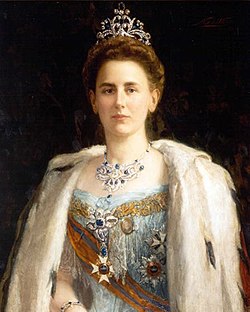 Queen Wilhelmina was a Dutch princess and queen of the Netherlands. | |
| Gender | female |
|---|---|
| Origin | |
| Word/name | Germanic |
| Meaning | "will helmet" or "willing to protect" |
| Other names | |
| Related names | Wilhelm, Wilma, Elma, Helmi, Minna, Velma, Vilma, Willa |
Wilhelmina (also: Wilhelmena, Wilhelmine, Wilhemina) is a feminine given name. It is the Dutch, German and Yiddish feminine form of Wilhelm (German), Willem (Dutch), or William (English). It is derived from the Germanic wil, meaning "will, desire" and helm, meaning "helmet, protection". Wilhelmina was ranked in the top 1000 most popular names for girls in the United States between 1900 and 1940, but is rarely used today. [1] Nicknames for Wilhelmina include, but are not restricted to, Minna, Mina, Mineke, Minnie, Willie, Willy, Willa, and Billie.